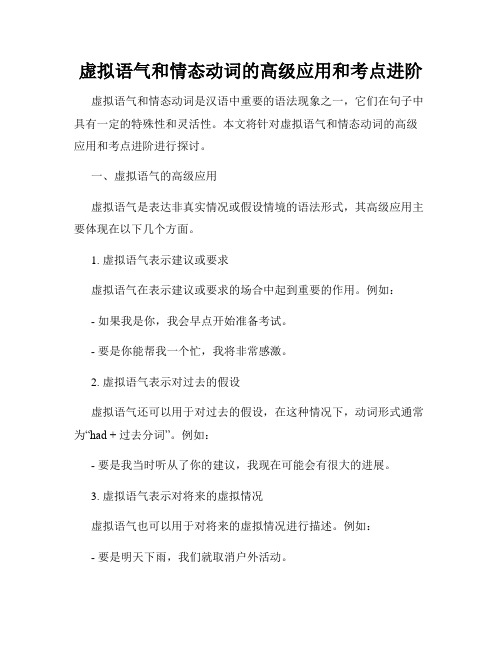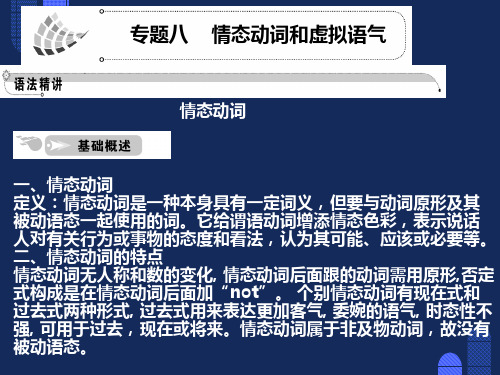情态动词和虚拟语气
中的情态动词和虚拟语气有哪些

中的情态动词和虚拟语气有哪些情态动词(Modal Verbs)是一类特殊的动词,在英语中常用来表达情态、态度、意愿、推测、能力、建议等含义,通常用来修饰其他动词。
而虚拟语气(Subjunctive Mood)是一种用来表示假设、愿望、建议、命令等非现实情况的语气。
情态动词一共有十个,它们分别是can、could、may、might、shall、should、will、would、must、ought to。
这些情态动词在语言表达中起到了很重要的作用,下面将对它们的具体用法进行介绍。
1. Can和CouldCan表示一种能力、可能性或许可性,用于表达某人能够完成某事。
Could表示过去或将来某个时间点的能力或可能性。
例如:- He can speak three languages fluently.(他能够流利地说三种语言。
)- Could you pass me the salt, please?(你能递给我盐吗?)2. May和MightMay表示许可、可能性或祝愿,用于表示允许某事发生或对现实情况的推测。
Might在语气上更加委婉,表达对现实情况的推测,表示较小的可能性。
例如:- May I borrow your pen?(我可以借用一下你的笔吗?)- I may/might go to the party tonight.(我可能今晚去参加派对。
)3. Shall和ShouldShall用于征询意见或提供建议,主要用于第一人称以及第三人称的单数和复数。
Should表示某事做起来更好,用于提出建议、义务或期望。
例如:- Shall we go out for dinner tonight?(我们今晚出去吃饭吧?)- You should take a break and relax.(你应该休息一下,放松一下。
)4. Will和WouldWill表示意愿、决心或预测,表示对未来的确定或实际情况。
虚拟语气和情态动词的高级应用和考点进阶

虚拟语气和情态动词的高级应用和考点进阶虚拟语气和情态动词是汉语中重要的语法现象之一,它们在句子中具有一定的特殊性和灵活性。
本文将针对虚拟语气和情态动词的高级应用和考点进阶进行探讨。
一、虚拟语气的高级应用虚拟语气是表达非真实情况或假设情境的语法形式,其高级应用主要体现在以下几个方面。
1. 虚拟语气表示建议或要求虚拟语气在表示建议或要求的场合中起到重要的作用。
例如:- 如果我是你,我会早点开始准备考试。
- 要是你能帮我一个忙,我将非常感激。
2. 虚拟语气表示对过去的假设虚拟语气还可以用于对过去的假设,在这种情况下,动词形式通常为“had + 过去分词”。
例如:- 要是我当时听从了你的建议,我现在可能会有很大的进展。
3. 虚拟语气表示对将来的虚拟情况虚拟语气也可以用于对将来的虚拟情况进行描述。
例如:- 要是明天下雨,我们就取消户外活动。
二、情态动词的高级应用情态动词可以用于表示说话人的态度、意愿以及对可能性和推测的判断。
以下是情态动词的高级应用。
1. 情态动词表示推测和可能性情态动词用于表示推测和可能性时,可以强调说话者的判断。
例如:- 他一定在家,因为他的车停在门口。
2. 情态动词表示许可和禁止情态动词还可以用于表示许可和禁止的意思。
例如:- 你可以用我的电脑。
- 禁止吸烟。
3. 情态动词表示建议和义务情态动词也可以表示建议和义务。
例如:- 你应该多锻炼身体。
- 你必须完成这个任务。
三、虚拟语气和情态动词的考点进阶除了虚拟语气和情态动词的基本应用外,还存在一些考点和进阶的用法。
1. 虚拟语气和情态动词的混合使用在某些情况下,虚拟语气和情态动词可以同时出现在一个句子中,用以表达更加灵活的语义。
例如:- 如果他今天来,我们会很高兴。
2. 虚拟语气和情态动词在条件从句中的应用在条件从句中,虚拟语气和情态动词的使用经常需要特别注意。
例如:- 如果我有时间,我愿意帮你。
3. 虚拟语气和情态动词在陈述句中的用法除了在虚拟条件句中使用外,虚拟语气和情态动词还可以在陈述句中使用,用以表示说话人的态度或意愿。
虚拟语气与情态动词的区别及用法解析

虚拟语气与情态动词的区别及用法解析虚拟语气和情态动词是语法中两个不同的概念,但在一些语法规则和用法上有一些相似之处。
虚拟语气是一种用来表示假设、愿望、建议、要求等非现实情况的语气,它并不是真实存在的,而是对虚构的事件或状态进行描述。
而情态动词则是一类用于表示说话人的态度、推测、能力、许可等情态意义的动词。
一、虚拟语气的用法1. 假设虚拟语气经常用于表示虚拟的假设情况,即与事实相反或不可能实现的情况。
常见的虚拟语气形式包括“如果…(过去式)”,“要是…(过去式)”等。
例如:- If I were a bird, I would fly freely in the sky.如果我是一只鸟,我就可以在天空中自由飞翔。
2. 愿望虚拟语气还可以用于表示愿望,即对现实情况的一种虚构或想象。
常见的虚拟语气形式包括“希望…(过去式)”,“但愿…(过去式)”等。
例如:- I wish I had studied harder last night.我希望昨晚学习更努力一些。
3. 建议、要求虚拟语气还可以用于表示建议、要求等情况。
常见的虚拟语气形式包括“(要求、建议)+过去式”。
例如:- The doctor suggested that I take some rest.医生建议我休息一下。
二、情态动词的用法1. 表示能力、推测情态动词可以用来表示说话人的能力或对某种情况的判断。
常见的情态动词有can、could、may、might等。
例如:- She can swim very well.她游泳技术非常好。
2. 表示许可、允许情态动词还可以表示许可或允许的意思。
常见的情态动词有can、may等。
例如:- Can I borrow your pen?我能借用你的笔吗?3. 表示义务、应该情态动词也可以表示说话人对某种行为或义务的责任或要求。
常见的情态动词有should、ought to等。
例如:- You should apologize to him for your mistake.你应该为你的错误向他道歉。
语法中的虚拟语气与情态动词的结合

语法中的虚拟语气与情态动词的结合虚拟语气是语法中一个重要的概念,它用来表达非真实的情况、假设、愿望或建议。
虚拟语气的使用涉及到情态动词,这是语法中另一个重要的部分。
情态动词用来表示说话人的态度、情感、能力等。
一、虚拟语气的概念和用法虚拟语气是用来表达非真实情况的一种语法形式。
它可以表示假设、愿望、推测、建议等。
虚拟语气通常与“if”引导的条件句、动词的过去式以及情态动词一起使用。
1. 条件句中的虚拟语气在条件句中,如果主句表达的是虚拟的情况,从句使用虚拟语气,即使用“were”代替“was”,无论主语是单数还是复数。
例如:If I were a bird, I would fly in the sky.(如果我是一只鸟,我会在天空中飞翔。
)2. 愿望中的虚拟语气在表达愿望时,常使用虚拟语气。
例如:I wish I could go on a vacation.(我希望我能去度假。
)这里的“could”就是虚拟语气。
3. 推测中的虚拟语气在表示对现在或过去情况的推测时,也需要使用虚拟语气。
例如:He acts as if he were the boss.(他表现得像是老板。
)这里的“were”代替了“was”,表示推测的情况。
二、情态动词的作用和用法情态动词是一类特殊的动词,用来表示说话人的态度、情感、能力等。
常见的情态动词包括can、could、may、might、shall、should、will、would、must等。
1. 表示能力和许可情态动词可以用来表示能力和许可。
例如:I can swim.(我会游泳。
)这里的“can”表示能力。
You may go now.(你现在可以走了。
)这里的“may”表示许可。
2. 表示推测和猜测情态动词也可以用来表示推测和猜测。
例如:He must be tired.(他一定很累。
)这里的“must”表示推测。
3. 表示义务和建议情态动词还可以用来表示义务和建议。
虚拟语气与情态动词

虚拟语气与情态动词虚拟语气表示说话人的愿望、假设、猜测或建议,而不表示客观存在的事实。
虚拟语气通过谓语动词的特殊形式来表示,下面对虚拟语气在各种句式中的用法分别介绍。
虚拟语气用于条件状语从句。
表示与现在事实相反的假设时,条件状语从句中的谓语动词用“过去式(be的过去式用were)”,而主句中的谓语动词用“would(should, could, might)+动词原形。
”例如:If I were you, I should studay English.If he had time, he would attend the meeting.表示与过去的事实相反的假设时,条件状语从句的谓语动词用“had +过去分词”,主句中的谓语动词用“would(should, could, might)+have +过去分词”。
例如:If you had taken my advice, you wouldn’t have failed in the examination.表示与将来事实相反的假设时,条件从句和主句所用的谓语动词怀“表示与现在事实相反的假设”的谓语动词相同,或者条件从句中用“were to(should)+动词原形”。
例如:If you come tomorrow, we would have the meeting.If it were to rain tomorrow, the meeting would be put off.当条件状语从句表示的行为和主句表示的行为所发生的时间不一致时,动词的形式要根据它所表示的时间来调整。
例如:If you had worked hard, you would be very tired.(从句说的是过去,主句指的是现在.)5.以上句型可以转换成下列形式:1)省略if,用“were, have, should +主语”. 例如:Were I in school again, I would work harder.Had you been here earlier, you would have seen him.Should there be a meeting tomorrow, I would come.但在虚拟条件状语从句中,省略连词的倒装形式的句首不能用动词的缩略形式,如我们可以说:Were it not for the expense, I would go to Italy.但不能说Weren’t it for the expense, I would go to Italy.2)用介词短语代替条件状语从句.例如:Without air, there would be on living things.But for your help, I couldn’t have done it.3)用其了方式表示.例如:It would produce had results to do that.= If you have done that, it would produce bad results.(二)虚拟语气用于宾语从句“wish +宾语从句”表示不能实现的愿望,汉语可译为“可惜……”. “……就好了”, “悔不该……”, “但愿……”等.表示现在不能实现的愿望,从句的谓语动词用过去式;表示将来不能实现的愿望用“would(could) +动词原形”;表示过去不能实现的愿望时用“had +过去分词”或“(could)would +have +过去分词”.例如:I wish it were spring all the year round.I wish you could go with us.We wish we had arrived there two hours earlier.虚拟语气在动词arrange, command, demand, desire, insist, order, propose, request, require, suggest,等后面的宾主从句中用“(should)+动词原形”.例如:We suggested that we (should) have a meeting.We insisted that they (should) go with us.The doctor ordered that she (should) stay in bed for a few days.He demanded that we (should) start right away.注意:insist作“力言”, “强调”解时,宾语从句不用虚拟语气,只有当insist作“坚持(认为)”, “坚持(应该)”解时宾语从句才用虚拟语气.例如:Mike insisted that he had never stolen anything.(三)虚拟语气用于表语从句、同位语从句作advice, idea, order, demand, plan, proposal, suggestion, request等名词的表语从句和同位语从句,其谓语动词要用虚拟语气的结构“(should)+动词原形”.例如:We all agreed to his suggestion that we (should) go to Beijing forsightseeing.My idea is that we (should) exercises first.(四)虚拟语气在as if(as though),even if( even though)等引导的表语从句或状语从句中的应用.如果从句表示的动作发生在过去,用过去完成时,指现在状况,则用过去时,指将来则用过去将来时.例如:He looked as if he were an artist.He speaks English so fluently as if he had studied English in England.Even if he were here,he could not solve the problem.(五)虚拟语气用于主语从句.在主语从句中,谓语动词的虚拟语气结构用“should 十动词原形”的结构,表示惊奇、不相信、惋惜、理应如此等.例如:It is necessary( important,natural,strange,etc) that …we should cleanthe room every day.It was a pity ( a shame,no wonder,etc) that you should be so careless.It will be desired( suggested,decided,ordered,requested,proposed,etc)that she should finish her homework this afternoon.在上述三种主语从句中,should意为“应该”,“竟然”,可以省去,但不可换用would.主句所用动词的时态不限.注意:这种从句表示的是事实.如果说话人对这种事实表现出惊奇的情感,就可用虚拟语气.反之,如果不表示惊奇等情感.That从句也可用陈述语气,例如:It is a strange that he did not come yesterday.It is a pity that you can’t swim.(六)虚拟语气用于定语从句这种从句常用在It is( high) time( that)…句型中,定语从句的谓语动词用过去式,或should十动词原形( should不能省略,be用were)来表示,意为“(现在)该……”。
语法中的情态动词与虚拟语气的用法

语法中的情态动词与虚拟语气的用法在语法中,情态动词和虚拟语气都是重要的概念。
它们在句子中起到不同的作用,用法也各有特点。
本文将详细介绍情态动词和虚拟语气的用法,并指导读者如何正确运用它们。
一、情态动词的用法情态动词是英语中的一类特殊动词,包括can、could、may、might、shall、should、will、would、must等。
它们通常用来表达说话人的意愿、能力、推测、建议等。
1. 表示能力与可能性情态动词can和could常用来表示能力和可能性。
例如:"She can swim."(她会游泳。
)"I could understand the movie."(我能理解电影。
)在这些句子中,can和could表达了能力与可能性的概念。
2. 表示推测与可能性情态动词may和might用于表示可能性和推测。
例如:"It may rain tomorrow."(明天可能会下雨。
)"She might be late for the meeting."(她可能会迟到会议。
)在这些句子中,may和might表达了对未来事件的推测。
3. 表示义务与建议情态动词should常用于表示义务和建议。
例如:"You should take a break."(你应该休息一下。
)"We should recycle to protect theenvironment."(我们应该回收以保护环境。
)在这些句子中,should表达了建议和应该做的事情。
4. 表示意愿与请求情态动词will和would通常用于表示意愿和请求。
例如:"I will help you with your homework."(我会帮你做作业。
)"Would you please pass me the salt?"(请你递给我盐吗?)在这些句子中,will和would 表达了说话人的意愿和请求。
语法篇专题情态动词和虚拟语气

用法
例句
can和could
表示能力
He can speak English better than you.
表示请求 或允诺?
You can have the book when I have finished it. Could you come again tomorrow?
表示客观可能性
should have done
过去本来应该……,而实际上没有……
The plant is dead. Maybe I should have given it more water.
ought to have done
过去本该……,而未……
You ought to have given him more help.
专题八 情态动词和虚拟语气
情态动词
一、情态动词 定义:情态动词是一种本身具有一定词义,但要与动词原形及其被动语态一起使用的词。它给谓语动词增添情态色彩,表示说话人对有关行为或事物的态度和看法,认为其可能、应该或必要等。 二、情态动词的特点 情态动词无人称和数的变化, 情态动词后面跟的动词需用原形,否定式构成是在情态动词后面加“not”。 个别情态动词有现在式和过去式两种形式, 过去式用来表达更加客气, 委婉的语气, 时态性不强, 可用于过去,现在或将来。情态动词属于非及物动词,故没有被动语态。
三、情态动词的语法特征 (1) 情态动词不能表示正在发生或已经发生的事情,只表示期待或估计某事的发生。 (2) 情态动词除ought 和have 外,后面只能接不带to 的不定式。 (3) 情态动词没有人称和数的变化,即其第三人称单数不加s。 (4) 情态动词没有非限定形式,即没有不定式,分词形式,也没有相应的动名词。 四、情态动词的基本用法
情态动词和虚拟语气 高考英语 语法

a test on the subject next month.
—Don’t worry.You________have it by Friday. A.could C.must 解析: B.shall D.may 句意为:——我至今还没有拿到参考书,但是下个月这
个学科就要测试了。——别担心,周五之前你一定会有的。本题考查情
(2008· 北京卷)John promised his doctor he would not smoke,and he
never smoked ever since.
约翰答应医生不再吸烟了,并且从那时起他再也不吸烟了。 (2)will 可以表示一种习惯性的动作,有“总是”或“总要”之意。 Every morning he will have a walk along this river. 每天早晨,他总是沿着小河散步。 7.may 与might (1)“may as well+动词原形”意为“最好,满可以,倒不如”。
You may as well do it at once.你最好马上就做这件事。
We may as well stay where we are. 我们留在现在的地方倒也不错。
(2)may 作“可以”讲时,其否定式常用“mustn’t”表示“禁止”;
- 1、下载文档前请自行甄别文档内容的完整性,平台不提供额外的编辑、内容补充、找答案等附加服务。
- 2、"仅部分预览"的文档,不可在线预览部分如存在完整性等问题,可反馈申请退款(可完整预览的文档不适用该条件!)。
- 3、如文档侵犯您的权益,请联系客服反馈,我们会尽快为您处理(人工客服工作时间:9:00-18:30)。
第一课1、I often see lights in that empty house.Do you think I report it to the police?A、shouldB、mayC、willD、can2、----The room is so dirty. we clean it?----Of course.A、WillB、ShallC、WouldD、Do3、My English—Chinese dictionary has disappeared.Who have taken it?A、shouldB、mustC、couldD、would4、It is suggested that a doctor immediately.A、be sent forB、send forC、is send forD、should send for5、When he was there,he go to that coffee shop at the corner after work every day.A、wouldB、shouldC、had betterD、might6、Mary never does any reading in the evening, .A、so does JohnB、John does tooC、John doesn’t tooD、nor does John7、----The computer is still on,could you have forgotten to turn it off?----Yes,I .A、could haveB、couldC、mustD、might have8、Research findings show we spend about two hours dreaming every night,no matter what weduring the day.A、may have doneB、would have doneC、must have doneD、should have done9、It’s 4 p.m.now and we’ve covered most of the distance.We arrive before dark.A、wouldB、shouldC、would ratherD、have to10、When the police took the suspect to the police station,he insisted that he the lady’spurse and that he free.A、not steal;be setB、didn’t steal;was setC、not steal;should beD、didn’t steal;be set11、Jenny have kept her word.I wonder why she changed her mind.A、mustB、shouldC、needD、would12、he knew nothing about her.A、He appears as ifB、It seems thatC、It appears as ifD、It seems as if13、Peter come with us tonight,but he isn’t sure.A、mustB、mayC、canD、will14、Helen go on the trip with us,but she isn’t quite sure yet.A、shallB、mustC、mayD、can15、----There were already five people in the car,but they managed to take me as well.----It a comfortable journey.A、can’tB、shouldn’t beC、must have beenD、couldn’t have been1-----5ABCAA 6----10DDABD 11---15BDBCD第二课1、----Is John coming by train?----He should,but he not.He likes driving his car.A、mustB、canC、needD、may2、----I heard they went skiing in the mountains last winter.----It true because there was little snow there.A、may not beB、won’t beC、couldn’t beD、mustn’t be3、I was really anxious about you.You home without a word.A、mustn’t leaveB、shouldn’t have leftC、couldn’t have leftD、needn’t leave4、so hard,he wouldn’t have passed the exam.A、Hadn’t he workedB、Hasn’t he workedC、If he didn’tD、If he doesn’t5、I wonder how he that to the teacher.A、dare to sayB、dare sayingC、not dare sayD、dared say6、It’s high time that he settled down in the city and a new life.A、startB、startedC、to startD、starting7、How I wish I to learn Japanese when I was ten.A、would beginB、beganC、should beginD、had begun8、----Excuse me,but I want to use your computer to type a report.----You have my computer if you don’t care of it.A、shan’tB、might notC、needn’tD、shouldn’t9、----Isn’t that Ann’s husband over there?----No,it be him—I’m sure he doesn’t wear glassesA、can’tB、must notC、won’tD、may not10、---Who is the girl standing over there?---Well,if you know,her name is Mabel.A、mayB、canC、mustD、shall11、But for your timely help,the boy his life.A、will loseB、has surely lostC、might have lostD、shouldn’t have lost12、What would you say if I you the truth.A、am going to tellB、were to tellC、have toldD、would tell13、----I didn’t go to see the doctor yesteday.----But you .A、ought toB、shouldC、ought to goD、ought to have14、----Mary hasn’t come home yet.----Well,where on such a night?A、must she have goneB、would she have beenC、could she have goneD、ought she to have been1-----5DCBAD 6----10BDAAC 11----14CBDC第三课1、----I hear you’ve got a set of valuble Australian coins. I have a look?----Yes,certainly.A、DoB、MayC、ShallD、Should2、Oh,I’m not feeling well in the stomach,I so much fried chicken just now.A、shouldn’t cutB、mustn’t have eatenC、shouldn’t have eatenD、mustn’t eat3、It has been anounced that candidates remain in their seats until all the papers have beencollected.A、canB、willC、mayD、shall4、He has always insisted on his Dr Turner instead of Mr Turner.A、been calledB、calledC、having calledD、being called5、He made a suggestion that the English test until nest Wednesday.A、will be put offB、be put offC、will put offD、put off6、I insist that a doctor immediately.A、has been sent forB、send forC、will be sent forD、be sent for7、the party,we would never have today’s happiness.A、If onlyB、Only ifC、But forD、If8、I would love to the party last night,but I had to work extra hours to finish a report.A、to goB、to have goneC、goingD、having gone9、In fact,you have shown me to this station—you know,I’m not a new comer.A、couldn’tB、shouldn’tC、needn’tD、mustn’t10、----Guess what?I drove my new car at a speed of 100 km this afternoon.It was fun.----Were you crazy?You yourself.A、can killB、might killC、would have killedD、could have killed11、The teacher ordered a lot of exercises three day’s time.A、be finishedB、would be finishedC、to finishD、being finished12、The fire spread through the hotel very quickly but everyone get out.A、had toB、wouldC、couldD、was able to13、----Are you coming to Jeffy’s party?----I’m not sure.I go to the concert instead.A、mustB、wouldC、shouldD、might14、They must have taken party in labor yesteday, ?A、didn’t they?B、mustn’t they?C、haven’t they?D、needn’t they?1-----5BCDDB 6----10DCBCD 11---14ADDA第四课1、----Be sure to get there on time, you?----Of course,we .A、will;willB、won’t;shallC、don’t;doD、can;must2、Jim to speak with them but they seemed to be in a hurry.A、would stopB、could stopC、must have stoppedD、would have stopped3、Although diet drinks,such as diet cola,don’t contain so much sugar and calories,theyreplace healthy drinks in the diet.A、can notB、may notC、should notD、mustn’t4、----Do you think the rain will affect the results of the football game?----Well,the players are used to such rainy weather,so it make any difference to them.A、shouldn’tB、needn’tC、mustn’tD、shan’t5、----Daddy,would you buy me an MP3 player if I do well in the first English speech contest?----I ,I promise.A、wouldB、willC、shallD、do6、---- you be sent abroad for further studies?----Well,I have !A、Shall;no such luckB、May;not so luckyC、Will;no such luckD、Must;not such a luck7、His failure in the experiment suggested that he the teacher’s instructions properly.A、shouldn’t have followedB、should not followC、mustn’t have followedD、hadn’t followed8、----Were you shown around Venice in a boat with those American tourists?----No,but I wish I .A、amB、wereC、hadD、should9、----He seems to be a student.----No,he .A、used toB、used to beC、used to haveD、used to have been10、Sorry,I’m late.I have turned off the alarm clock and gone back to sleep again.A、mightB、shouldC、canD、will11、I wish to go home now, I?A、mayB、can’tC、mustD、do12、The taxi only hold six passengers.It is full.You take the next one.A、may;mayB、can;mayC、may;canD、must;can13、Johnny,you play with the knife,you hurt youtself.A、won’t;can’tB、mustn’t;mayC、shouldn’t;mustD、can’t;shouldn’t14、----Why didn’t come to my party?I was so disappointed at your absence.----I’m very sorry.I but I had a visitor at the last minute.A、would like haveB、would like toC、would like to haveD、would like15、---- I go back before lunch?----No,I don’t think you .A、Need;mustB、Do;need toC、Must;have toD、May;ought to1-----5ADCAB 6----10CDCBA 11---15ABBCC。
